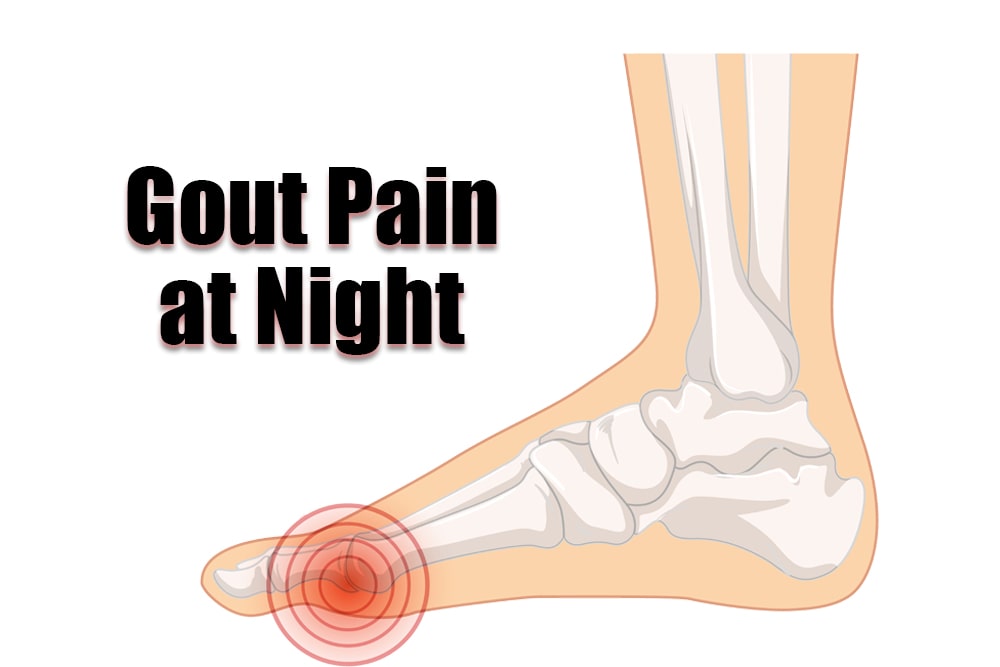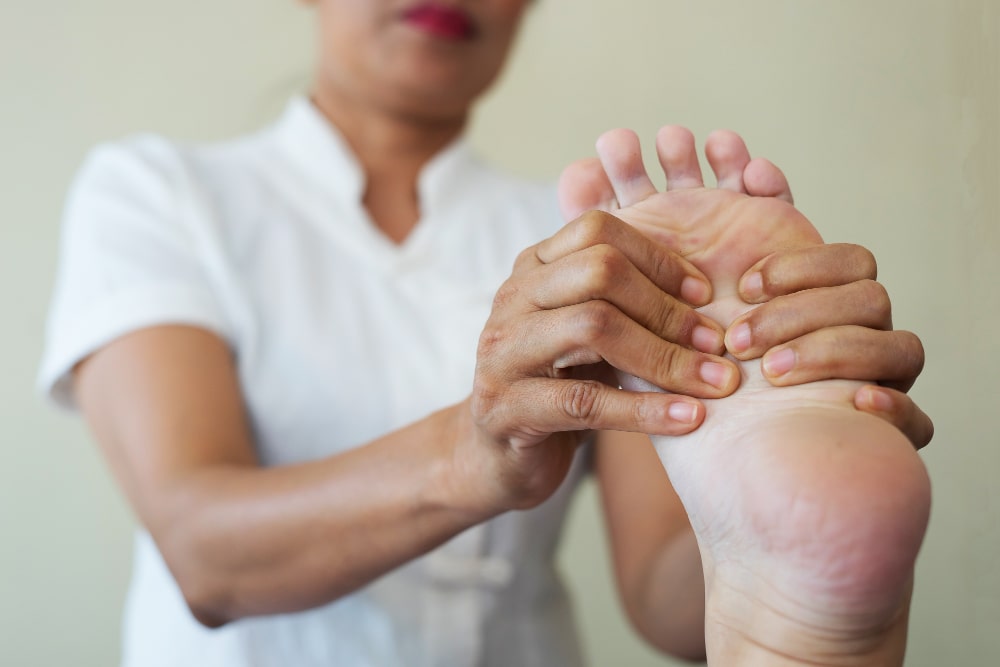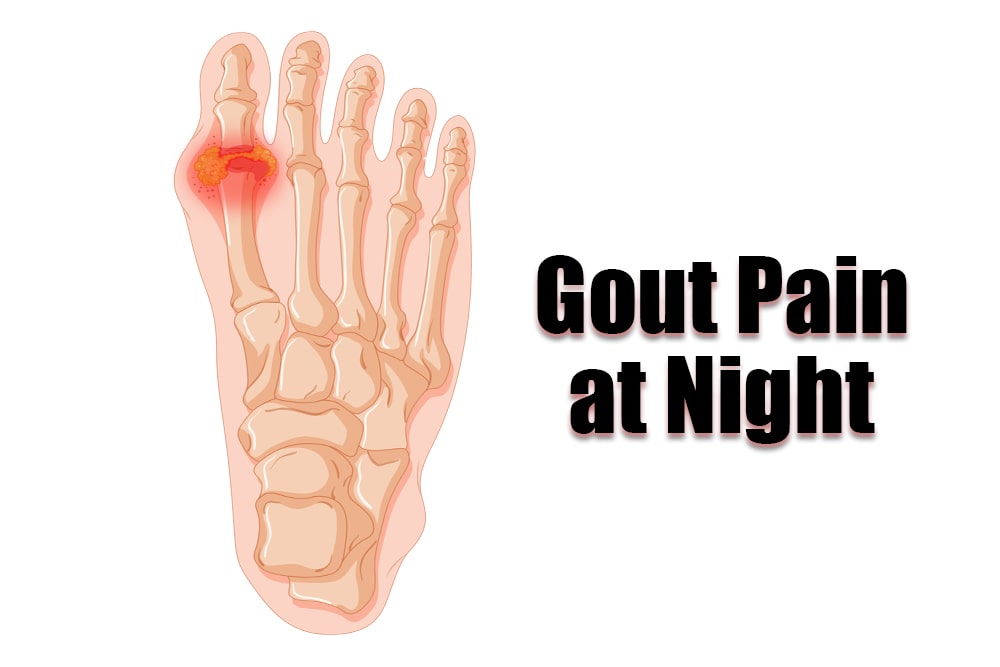Gout is a type of inflammatory arthritis caused by an accumulation of uric acid crystals in the joints. It is a common and painful condition that can affect people of all ages, genders and backgrounds. Gout pain often strikes at night, making sleep difficult or impossible. If you are living with gout, you may be wondering how to stop the pain and get some rest. This article will provide an overview of how to stop gout pain at night, including natural remedies and lifestyle modifications. We will also discuss when to seek medical help for gout-related issues.
What is Gout?
Gout is a type of arthritis caused by increased levels of uric acid in the joints and tissues. Uric acid is a chemical that occurs naturally in the body and is produced when cells break down purines found in certain foods. High uric acid levels can cause tiny monosodium urate crystals to form, accumulating around the joints and surrounding tissues. This causes swelling, redness, stiffness and pain.
The Challenge of Gout Pain at Night
Gout pain is often worse at night due to the body’s natural circadian rhythms. Circadian rhythms are the body’s internal clock, which regulates many physiological functions and can influence inflammation levels. As a result, gout symptoms may be more severe at night than during the day. This can make it difficult to get a good night’s sleep and lead to exhaustion the next day.
Read More: Subscapularis Pain: What Causes It, and How to Relief Pain
Causes and Triggers of Gout Pain
Identifying Gout Triggers
In order to effectively stop gout pain at night, it is important to identify what causes or triggers your symptoms. Common triggers include certain foods such as red meat, shellfish, alcohol, sugary drinks and processed foods. Certain medications, such as diuretics and certain blood pressure medications, can also increase the risk of gout.
In addition to diet and medication, lifestyle factors such as stress, obesity, and dehydration can all contribute to increased uric acid levels and subsequent gout attacks. Therefore, it is important to take note of what activities or situations seem to trigger your gout pain and try to avoid or stop these triggers when possible.
Why Gout Pain Strikes at Night?
It is not fully understood why gout pain often strikes at night, but several theories exist. One theory is that the body’s natural circadian rhythms can lead to increased inflammation levels during the night, leading to increased gout pain. Another theory is that the body’s fluid levels tend to be lower at night, which can lead to an accumulation of uric acid in the joints and tissues. Regardless of the cause, it is important to find ways to manage the pain so you can get a good night’s rest.

Read More: Lateral Hip Pain: What Causes It, How to Relief Pain?
Medications for Gout
Overview of Gout Medications
There are a variety of medications available to help stop gout pain at night. These include both prescription and over-the-counter (OTC) options. Prescription medications such as nonsteroidal anti-inflammatory drugs (NSAIDs), corticosteroids, and immunosuppressants can reduce inflammation, pain, and swelling. OTC medications such as acetaminophen, ibuprofen, and naproxen can relieve gout pain.
Prescription vs. Over-the-Counter Options
Prescription medications are generally more powerful than OTC options and may be necessary if you have severe gout pain or symptoms that do not respond to other treatments. However, it is important to be aware of the potential side effects and interactions with prescription medications. OTC options are generally better tolerated but should also be used cautiously, as they can have adverse effects if taken in large doses or on an empty stomach.
Read More: Laser Therapy for Pain: A Beacon of Hope in Alleviating Discomfort
Dietary Changes
Gout-Friendly Foods
Making changes to your diet can help reduce gout pain and prevent future attacks. The best way to manage your symptoms is to eat a healthy, balanced diet that includes plenty of fruits and vegetables, whole grains, fish, lean meats, and low-fat dairy products. You should also limit foods high in purines, such as red meat, organ meats, shellfish, sugary drinks and processed foods.
Foods to Avoid
In addition to limiting purine-rich foods, it is important to be aware that certain foods can trigger gout pain. These include alcohol, especially beer and wine, caffeine, and high-sugar drinks such as sodas and energy drinks. You should also limit your intake of processed meats such as bacon, sausage, salami, and hot dogs.
Importance of Hydration
Staying hydrated is an important part of preventing gout pain at night. Drinking plenty of water throughout the day helps to keep your uric acid levels in check and prevents dehydration, which can exacerbate gout symptoms. It is also important to avoid drinking too much alcohol or caffeinated beverages, as these can lead to further dehydration.
Read More: Chest Pain While Pregnant: What Causes It, How to Relief Pain?
Lifestyle Changes for Gout Pain Relief
Exercise
Regular exercise can help reduce gout pain and prevent future attacks. Low-impact activities such as walking, swimming, or cycling relieve joint pain and swelling. Regular exercise can also help reduce stress levels and promote overall health.
Stress Management
Stress can trigger gout pain and make it more difficult to stop. It is important to find ways to reduce stress in your life and take time for self-care. Engaging in relaxation activities such as yoga, meditation, or deep breathing can help reduce stress levels and alleviate gout pain.
Weight Management
Obesity is a common risk factor for gout. Maintaining a healthy weight can help reduce gout pain and prevent future attacks. Eating a balanced diet and exercising regularly are the best ways to keep your weight in check.
Read More: Pain Inside Thigh: Causes, Treatment, and Prevention
Natural Remedies for Stop Gout Pain at Night
Ice and Heat Therapy
Ice and heat therapy can be used to reduce gout pain at night. Applying a cold compress for 15-20 minutes daily can help reduce inflammation and swelling. Alternating between cold and hot compresses is also beneficial, as it helps improve circulation and reduce stiffness.
Epsom Salt Baths
Taking an Epsom salt bath can help reduce gout pain and swelling. The magnesium sulfate in the salts helps to draw out toxins and reduce inflammation, while the warm water helps to relax muscles and relieve stiffness.
Herbal Supplements
Herbal supplements such as ginger root, turmeric, and bromelain have all been used to treat gout pain. Ginger root can help reduce inflammation and swelling, while turmeric has anti-inflammatory properties and bromelain helps to break down uric acid crystals. However, it is important to talk with your doctor before taking any herbal supplements as they may interact with other medications.
Read More: Belly Button Pain During Pregnancy: Causes and Remedies
Pain Management Strategies
1) Breathing Exercises
Breathing exercises can help reduce gout pain and provide distraction from the discomfort. Deep, slow breaths can help to relax tense muscles and promote overall relaxation. Focusing on your breath rather than the pain can help you quickly fall asleep.
2) Relaxation Techniques
Relaxation techniques such as progressive muscle relaxation, guided imagery, and self-hypnosis can help reduce stress levels and relieve gout pain. Spending time practising these techniques can help you get better quality sleep and reduce your overall discomfort.
3) Distractions
Distraction methods such as watching television or listening to music can help stop gout pain at night. Focusing on something other than the pain can help reduce stress levels and provide a distraction from the discomfort.
4) Over-the-Counter Pain Relievers
Over-the-counter pain relievers such as ibuprofen or acetaminophen can reduce gout pain when all else fails. Taking these medications on a full stomach and avoiding alcohol can help prevent side effects. However, it is important to talk with your doctor before taking any OTC medication to make sure they are safe for you to use.
5) Heat and Cold Therapy
It is important to be mindful of when you use heat and cold therapy. Heat can help reduce stiffness, while cold can help reduce inflammation and swelling. It is also important to take breaks between each session, as overuse can lead to skin irritation or burns.
Read More: Pain After Ejaculation: Causes, Symptoms, and Treatment
Preventing Nighttime Gout Attacks
Bedtime Routines
Establishing a bedtime routine can help reduce gout pain and prevent future attacks. Try to go to bed at the same time each night and avoid activities that can interfere with sleep, such as drinking alcohol or watching television too close to bedtime. You should also limit your caffeine intake throughout the day and refrain from working out within 2-3 hours of going to bed.
Sleep Hygiene
Creating a comfortable sleep environment is important in managing gout pain at night. Make sure your mattress is supportive and not too soft, as this can put extra pressure on your joints. It would help if you also tried to keep the room dark and cool, as these are conducive to better sleep. Finally, avoid electronic devices within an hour of bedtime, as the blue light emitted from these devices can interfere with quality sleep.
Footwear and Orthotics
Wearing the right type of footwear can help reduce gout pain and prevent future attacks. Choose supportive and comfortable shoes, as poor-fitting or ill-supported shoes can put extra pressure on your joints. Custom orthotics can also help support your feet and ensure proper alignment.
Read More: Sigmoid Colon Pain: What Causes It, How to Relief Pain?
When to Seek Medical Help

If home remedies do not provide relief for your gout pain or if you experience frequent attacks, it is important to seek medical help. A doctor can help diagnose underlying causes and recommend treatment options to reduce discomfort and prevent future attacks. Your doctor may also prescribe medications such as nonsteroidal anti-inflammatory drugs or corticosteroids to help reduce inflammation and swelling.
Conclusion
Gout is a painful condition that can be managed with proper lifestyle changes and home remedies. Eating a balanced diet, getting regular exercise, practising stress management techniques, and taking natural supplements can all help reduce gout pain. However, if these measures are insufficient to provide relief, it is important to seek medical help. With the right treatment plan and lifestyle modifications, you can stop your gout pain and enjoy a healthy, active lifestyle.
Read More: Stomach Bug While Pregnant: Causes, Symptoms, Remedies
FAQs
Yes, certain foods can increase the risk of gout attacks. Foods high in purines, such as red meat, seafood, and organic meats, should be avoided. The same is true for alcoholic beverages and sugary drinks. Eating a balanced diet that includes vegetables, fruits, and complex carbohydrates can help reduce the risk of gout attacks.
Yes, gout pain can worsen at night due to decreased movement and increased joint pressure. Fortunately, there are several strategies you can use to stop gout pain during the night, such as taking an Epsom salt bath, practising breathing exercises, using distraction methods, and wearing supportive footwear.
Yes, massage can help reduce gout pain by increasing circulation and improving mobility in affected joints. Gentle strokes and stretches also help to relax tense muscles and promote overall relaxation. It is important to talk with your doctor before receiving a massage to ensure it is safe.

